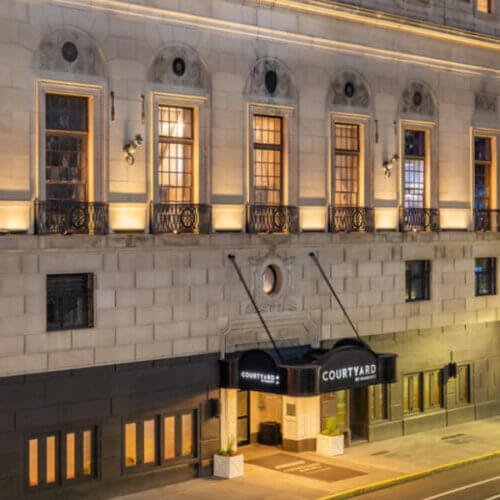
In a recent discussion on the Hospitality Daily Podcast, Adam Robinson, CEO of Hireology, provided valuable insights from two significant studies: the Hireology 2024 Hospitality Applicant Survey and the Hireology-AHLA Food & Beverage Hiring Report. These reports unveil essential strategies for hotel operators to tackle hiring challenges and convert recruitment into a competitive edge. This article distills the conversation and insights into actionable strategies, empowering hotel managers to fulfill candidate expectations in today’s intricate labor market.
The Landscape: Hotel Hiring Trends Today
In 2024, there has been a significant transformation in hospitality hiring. Robinson notes, “What we’ve seen happen this year is general sluggishness after a breakneck pace of hiring.” Hotels are primarily “hiring to the replacement rate” rather than expanding their workforce, a change prompted by decreased financing and limited property development. This shift underscores the importance of every new hire.
Complicating the landscape further is a significant shift in how candidates view job offers. As Robinson observes, “There’s more confidence in their employment prospects. People are more selective now. Now it’s more like, ‘Okay, I appreciate that you’re interested in employing me, but is this the best thing for me? How will this alter my life for the better?’” Candidates who once prioritized salary now seek stability, flexibility, and opportunities for growth.
What This Means for Hotel Operators
Higher Stakes for Each Hire: With budget constraints and limited new positions, each new hire is critical. Hotel managers must create supportive and stable work environments to remain competitive.
Candidate Selectiveness: Today’s job seekers desire more than just a paycheck; they have options. Robinson notes, “There is a greater emphasis from the job seeker in their search on flexibility and general well-being.” Hotels that align their offerings with these priorities will gain a competitive advantage.
Top Takeaways from Research on Hotel Hiring
Robinson shared insightful data revealing key trends in what job seekers prioritize and how hotels can refine their recruitment strategies. Here are some notable findings:
Flexibility Ranks High, Right After Pay: While compensation continues to be a leading factor, candidates are increasingly valuing flexibility. Hotels can leverage flexibility to help mitigate turnover and wage inflation.
Candidates Seek Growth and Well-Being: Job seekers now favor employers that prioritize their well-being and career development. This trend offers hotels a chance to move beyond the “wage spiral” and attract long-term staff by outlining clear growth pathways and fostering a positive workplace culture.
The Power of Referrals: Approximately 88.5% of hospitality job seekers are willing to refer friends to a prior employer if their experience was positive, making referrals a potent recruitment channel. “Hotel management can drive 40% of their hires from referrals,” Robinson emphasizes, highlighting the importance of a robust referral program.
Application Abandonment Remains High: Up to 73% of candidates abandon applications that are overly lengthy or complicated, particularly on mobile devices. Streamlining the application process is crucial to retain potential candidates.
Make the Job Application Process Easier
Robinson points out that nearly 80% of individuals conduct their job searches via mobile devices, yet cumbersome applications pose a major challenge. Long, multi-step forms deter applicants, especially younger candidates, from completing their applications.
Here’s how to streamline the process:
Minimize Required Fields: Limit applications to essential information like name, contact details, and key qualifications. Applications with 5-7 fields or fewer are more likely to be completed.
Optimize for Mobile: Robinson advises, “If your website requires users to create a login to apply for a job, you’re losing about 70% of your traffic.” Ensure applications are mobile-friendly with simplified fields and straightforward navigation.
Experience Your Own Application Process: “Try to apply for a job at your own hotel on your phone and just note the experience,” Robinson suggests. This can help identify bottlenecks and areas that need improvement.
Action Step: Test your hotel’s application process on a mobile device. Streamline fields and remove unnecessary steps, such as logins, to ensure a smooth and quick candidate experience.
How to Drive More Referrals
Referrals provide hotel employers with a cost-effective method to source high-quality candidates. Robinson stresses that a well-structured referral program should be straightforward, transparent, and rewarding. “Hotel management can drive 40% of their hires from referrals,” he states, demonstrating the effectiveness of recruiting loyal and engaged talent.
Make Referrals Easy: Enable employees to submit referrals easily using QR codes, text links, or a dedicated mobile page. Avoid convoluted processes or paper forms.
Provide Real-Time Updates: Employees should be able to track the status of their referrals. Transparency encourages engagement, as employees are aware of when they will receive bonuses or observe their referral progress.
Automate Payouts: Integrate the referral process with payroll and hiring systems to automate referral bonuses, preventing employees from needing to follow up manually.
Action Step: Implement an easy-to-use, technology-driven referral program throughout your team, featuring regular updates and incentives to stimulate participation.
Action Items for Hotel GMs and Property-Level Hiring Managers
Robinson advises hiring managers to prioritize speed and consistent communication. Here are his top two metrics for maintaining an efficient hiring process:
Respond to Applications Within 24-48 Hours: The most crucial action is to communicate promptly. Treat applicants as you would treat guests.” Prospects expect a quick response, ideally within 24-48 hours, to remain engaged in the process. Delays can lead to candidate drop-off.
Schedule Interviews Quickly: “Candidates desire the process to advance swiftly,” Robinson explains. A significant 88% of candidates prefer interviews within a week of applying. Promptly scheduling interviews helps deter candidates from accepting other job offers before you can reach them.
Action Step: Make review speed and time-to-interview key performance indicators (KPIs) for property managers. Setting reminders or automated messages can ensure candidates receive timely updates as per the recommended timeframes.
Action Items for Corporate Hotel Leaders
Corporate leaders have a significant opportunity to foster a data-driven and efficient hiring process across properties. Robinson emphasizes the importance of data transparency and hiring support for each property.
Implement Centralized Tracking and Data: Leaders should maintain visibility into hiring metrics at the property level to assess the efficiency of each location’s processes. Robinson suggests that corporate leaders should “manage by exception” to identify properties that are thriving or in need of support.
Encourage and Standardize Referrals: Invest in a company-wide referral program and educate property managers about the associated benefits. “Are you aware of which five hiring managers are the slowest to review applicants across your portfolio?” Robinson inquires, suggesting that leaders could use this information to replicate successful strategies across properties.
Build an Alumni Network: Research from Hireology indicates that 77% of former employees would consider returning to a previous employer if their experience was positive. Corporate leaders should maintain connections with past employees by frequently updating them about new openings.
Action Step: Invest in tracking tools for property-specific insights and allocate resources to support referral programs and alumni engagement initiatives.
Summary Recap
The current hospitality hiring landscape is intricate, with job seekers valuing flexibility, streamlined application processes, and responsive communication. Insights from Adam Robinson, backed by data from Hireology’s studies, suggest several strategies hotels can implement to remain competitive:
Prioritize Flexibility and Well-Being: Today’s candidates regard work-life balance, growth, and corporate culture as crucial as salary.
Simplify the Application Process: Optimize applications for mobile with fewer fields and eliminate unnecessary steps to reduce abandonment rates.
Strengthen Referral Programs: When referral processes are straightforward and incentivized, they can constitute nearly 40% of hires.
By adopting these strategies, hotel operators can attract and retain top talent, aligning their hiring practices with the priorities of today’s workforce, and transforming recruitment into a sustainable competitive advantage.
Resources:
- Survey of Hospitality Job Seekers by Hireology
- Hotel Food & Beverage Hiring research by Hireology
- The Hospitality Hiring Best Practices Checklist by Hireology
The post The 2024-2025 Hotel Hiring Playbook: Insights and Strategies from Adam Robinson, CEO of Hireology appeared first on Hotel Operations.
For further information, please visit our Source .






















